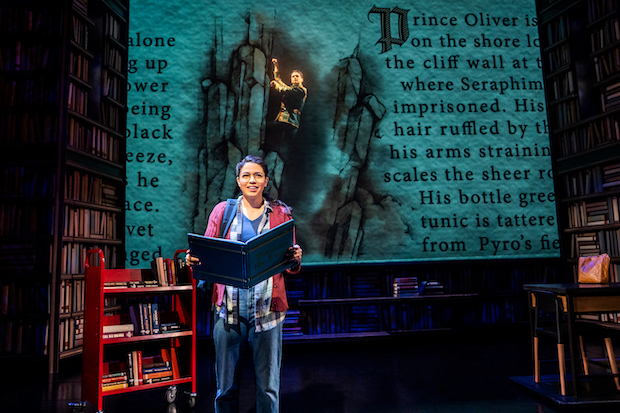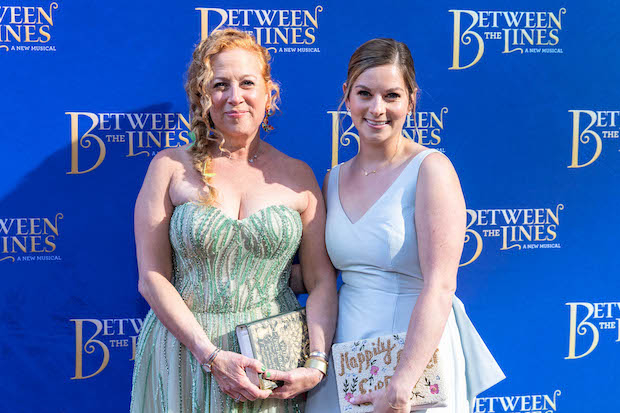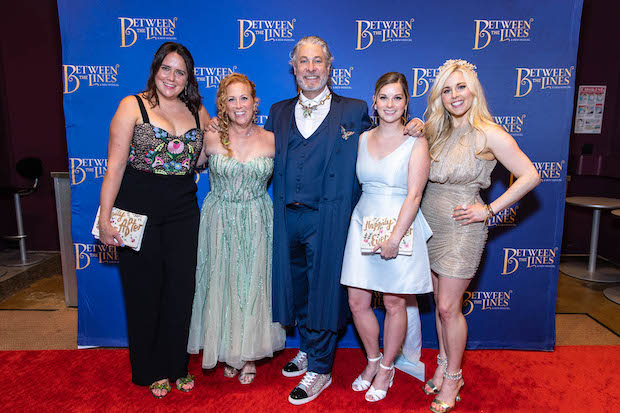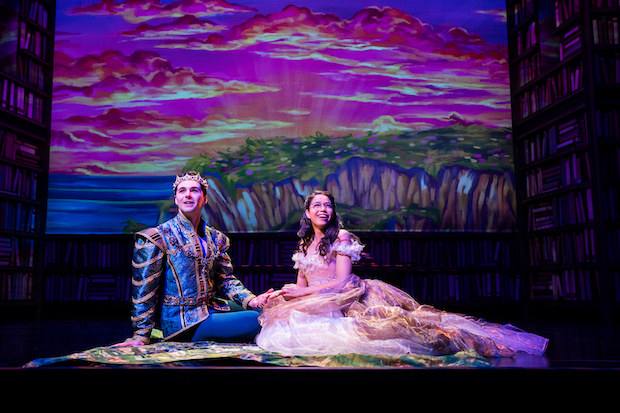Jodi Picoult and the Team Behind Between the Lines Reflect on the Power of Female Voices in Theater
”Between the Lines”, based on the novel by Picoult and her daughter Samantha, is now running at the Tony Kiser Theater.

(© Matthew Murphy)
When bestselling author Jodi Picoult set out to adapt her YA novel Between the Lines into a musical, she was trying to locate two unicorns.
At least that's how she described her search to find a female songwriting team. She soon learned that such teams are still a relative rarity in the theater world. (To date, only one all-female songwriting team has won the Best Score Tony Award.)
Like the novel by Picoult and her daughter Samantha Van Leer, the musical Between the Lines (currently playing off-Broadway at the Tony Kiser Theater) tells the story of 17-year-old Delilah McPhee who finds solace in her favorite fairytale — and in its handsome prince — as her own world threatens to fall apart.
"Because ultimately this is a coming-of-age story for a teenage girl, I felt that female songwriters who had experienced some of what Delilah had would be able to write from a place of understanding in a way that a man might not," Picoult explained.

(© Rebecca J Michelson)
Fortuitously Picoult connected with Kate Anderson and Elyssa Samsel. The three songs they wrote for her on spec are still in the musical. ("Between the Lines," "Allie McAndrews," and "A Whole New Story" are available to stream on Spotify.) "It's a testament to their talent and their connection to the material" Picoult said. She had found her unicorns.
Between the Lines is a female-driven show with an unusual number of women on its creative team and many strong female characters onstage. Writers Samsel, Anderson, and Picoult, as well as performer Julia Murney, recently shared their experiences working on this new musical and reflected upon what it means to tell stories by women and about women — especially at this moment in time.
From their first encounter with the novel, Samsel and Anderson related strongly to the story's themes of friendship, family, and self-empowerment. They appreciated how Delilah ultimately learns that she does not need her prince to save her; she can save herself.
And how did they make Picoult and Van Leer's story sing?
According to Samsel, they always knew they wanted to build two different musical worlds that would come together by the end of the show to "create a joint genre." The songwriters, who work in tandem to craft both music and lyrics, drew inspiration for the fairy tale world from classic Disney sounds. In contrast, the songs for Delilah's high school are infused with a Taylor Swift-style pop sensibility.

(© Rebecca J Michelson)
The songwriters had always wanted to give the score a joyful sound, but that intention took on more significance when the production's spring 2020 opening was postponed due to the pandemic. Now, they hope their score will "make people feel joy again and welcome them back into the theater and into their lives."
For the past eight years, Samsel and Anderson have worked alongside producer Daryl Roth, book writer Timothy Allen Macdonald, and director Jeff Calhoun to bring Between the Lines to the stage. Picoult and Roth served as role models to Samsel and Anderson throughout the development process. "We have so much gratitude for Daryl and Jodi, for pointing the way and teaching us how to own our place in the room," said Anderson.
The songwriters set a tone in the room that was open, respectful, and collaborative. On the first day of rehearsal, Murney, who does double duty as Delilah's mother Grace and the fairytale queen, found herself restructuring one of her songs with Samsel and Anderson.
"We changed up some melodic lines and then also dealt with some lyrics changes that helped tell the story better," she said. "They were so open to that, which is such a complete high for me, to feel like I get to be a part of it."
The writers were thrilled to have Murney's creative input. "When you're lucky enough to get to work with actors of that caliber, you learn so much about how they end up inspiring the work itself," said Anderson.
Additionally, Murney found that being in a room with "so many women in a position of creative power" felt especially "safe" in this instance. There is something special, she noted, about telling a story about "a young girl that is written by people who have gone through the world of being a young girl."
Even when women are onstage, the female perspective is often missing from creative teams. Picoult observed that musicals have historically been told "through a white, cis male gaze." Despite recent "incremental inching toward diverse stories in theater," she believes "women's stories — by and about women — are still rare."

(© Matthew Murphy)
There are relatively few shows with smart teenage girls as protagonists. And even fewer that depict the type of nuanced relationship Delilah has with her mom. Or, on a lighter note, the jokes about menopause and bra straps.
"We don't often get an authentic view of that mother-daughter relationship and female-to-female relationships in general. We really wanted to represent what felt real," said Anderson.
"I think that's something that they calibrated really beautifully," Murney said, clarifying that Calhoun and McDonald were an important part of crafting the mother/daughter dynamic too. "For the mom and the daughter, you have to squeeze into the scenes just the right amount of exposition, the right amount of character development."
Samsel and Anderson found it slightly surreal to musicalize the story's mother-daughter relationship when the mother and daughter who wrote the original source material were often present in the rehearsal room.
"It was really magical to be able to watch that relationship between Jodi and Sammy, to see what it looks like when a mother and a daughter do come together, and join up as a team," said Samsel.
In the show, Delilah realizes that she can become the protagonist of her story. Murney believes Delilah's journey has a universal message. "Hopefully everyone can see a part of themselves, if not physically onstage, textually onstage."
Given the current zeitgeist, the idea of a young woman taking control of her story feels more poignant and necessary than ever.
"I hope that people leave feeling empowered," Anderson said, "feeling like even the smallest step forward can change their lives.
On the day the Supreme Court overturned Roe v. Wade, Picoult gave the postshow curtain speech at Between the Lines. She made a point of thanking the audience. "Knowing that 300 people had bought a ticket to a show about a teenage girl's dreams and fears and hopes was so validating, to me, and reminded me that there are still people in America who believe women matter."









